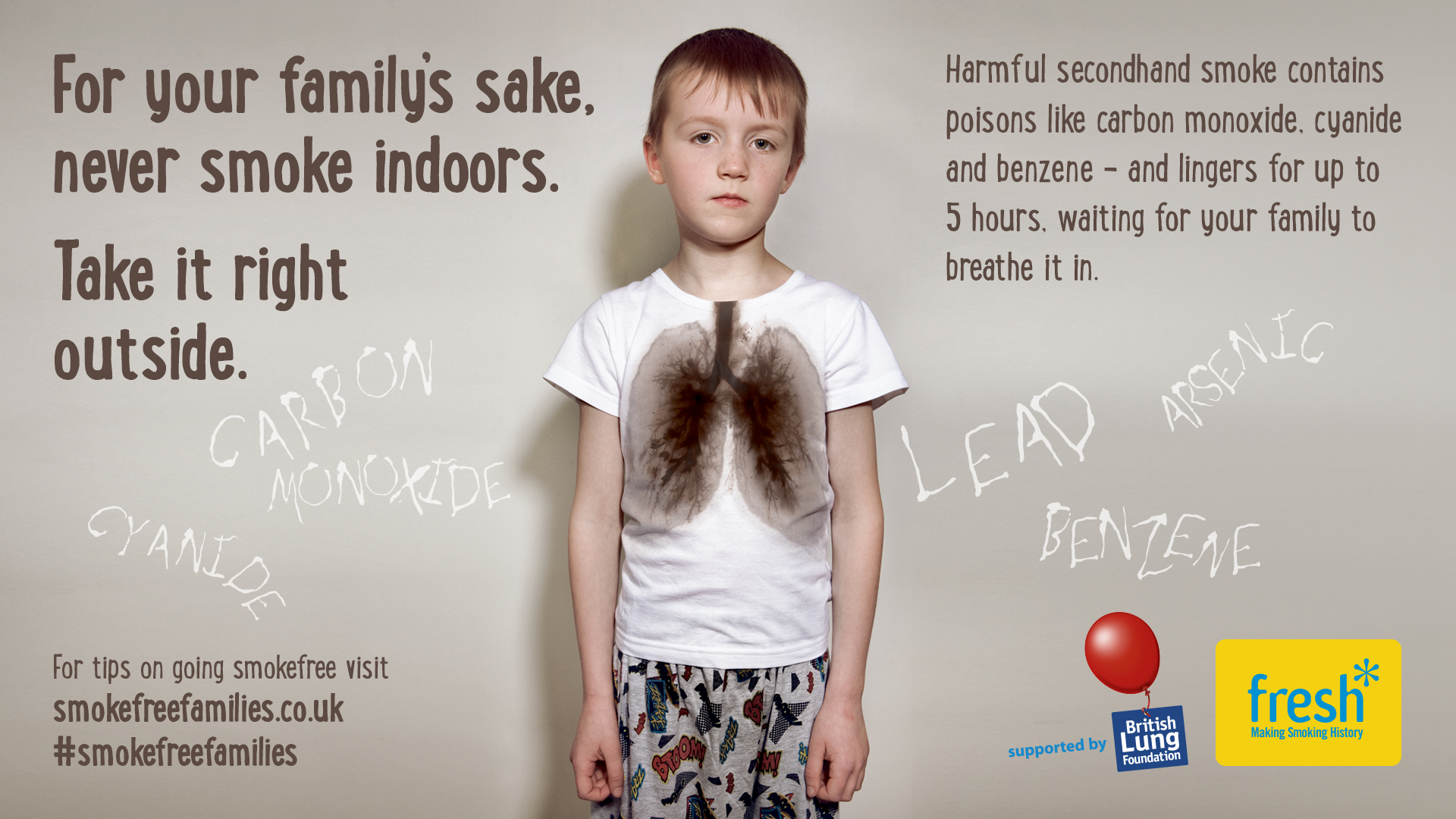Over half of smokers are smoking at home around others

Worrying new figures suggest that over half of smokers are smoking inside the home around others, including children and adult non-smokers. It comes as a campaign launches this week in the North East encouraging people to quit or take it right outside.
As the nights start to draw in, some smokers might be tempted to further relax rules around smoking. But smokers are being warned of the dangerous chemicals in tobacco smoke which can harm the family’s health, raising the risks of serious illness such as asthma and heart disease.
Worryingly, a survey in July in the North East found too many adults and children in the region are exposed to harmful secondhand smoke:
- Over half of smokers (54%) said they smoke in the home when others are around – 28% on a daily basis
- In nearly half those occasions (45%), adult non-smokers are present, while 10% of the time children are present
The “Secondhand Smoke is Poison” campaign is launching from Fresh this week, encouraging people to visit www.smokefreefamilies.co.uk for tips and support to stop smoking, or at least take it outside. Supported by the British Lung Foundation, the campaign originally ran in Scotland where it led to a drop in hospital admissions among under-fives for asthma of around 25% between 2014-2018.
Secondhand smoke contains thousands of chemicals including poisons like carbon monoxide, lead, polonium 210, arsenic and benzene and lingers throughout the house long after you can smell it. And all the family are at risk:
- Children who live in a household with a smoker are much more likely to develop asthma, chest infections like pneumonia and bronchitis, meningitis, ear infections, coughs and cold. (Source:NHS.uk)
- Among adults, secondhand smoke can worsen asthma and cause lung cancer and increases the risk of heart disease, stroke and Chronic Obstructive Pulmonary Disease (COPD).
Ailsa Rutter OBE, Director of Fresh said: “No-one wants to put their family at risk but it is clear that COVID has created its own pressures, with more families at home together. We recognise that nearly all smokers get hooked during childhood and the power of this addiction, with many keen to quit but who struggle to do so. The best thing anyone who smokes can do right now for their health and their family’s health is to stop smoking completely – but if you find you can’t quit then take it right outside, away from other household members.”
“Secondhand smoke is full of health-damaging poisons such as carbon monoxide and because of the way it drifts and lingers, opening the window or back door does very little to protect people’s health. Quitting or taking it completely outside is the only way.
She added: “While it is good that smoking is now illegal in private vehicles with children present, it is also still illegal in workplace vehicles and seeing people smoking in taxis and vans is still far too common, putting health at risk of non-smokers who are exposed in such a tiny space.”
Figures from the British Thoracic Society in 2016 suggest that one in three children who ends up in hospital with an asthma attack had been exposed to cigarette smoke.
Dr Malcolm Brodlie, consultant in paediatric respiratory medicine at the Great North Children’s Hospital, said: “Breathing in secondhand smoke is harmful to people from all age groups, but children are especially vulnerable as their lungs are still developing and they breathe faster than adults, so inhale more of the harmful poisons. There is no safe level of exposure.
“We see the effects of this on hospital wards too often. Children and babies who are exposed to second-hand smoke are more likely to develop coughs, wheeze, asthma and infections like pneumonia and bronchiolitis. Children exposed to smoke are also more likely to develop middle ear infections which can be painful and require medical attention. But adults are at risk too.”
Lorna Hardy, 38, who lives in County Durham, quit smoking in 2011 and is supporting Fresh’s campaign after realising how harmful secondhand smoke can be. She said: “Around the time I started to think seriously about quitting, I’d stopped enjoying smoking. I used to smoke in the house, but I’m very house proud, so I became aware of other people’s perceptions and I was conscious of what they might be inhaling.
“When I think about it now, I feel like it was selfish of me to smoke around other people. I didn’t think about the impact it was having on them. Now I know that the dangers of secondhand smoke can be serious. The chemicals and carbon monoxide that you breathe in get passed on to anyone around you, both when you exhale and from the burning end of the cigarette.
“Given the need for everyone to stay healthy due to COVID, it makes you realise just how important it is to quit smoking and not smoke around others.”
Dr Adam McDiarmid, Consultant Cardiologist at Newcastle-upon-Tyne Hospitals NHS Foundation Trust, said: Stopping smoking is important for your own health, but stopping will also help the health of those around you. Secondhand smoke has a meaningful, and detrimental effect to the health of those around you and is a major cause of heart disease. With us all spending more time at home, secondhand smoke might be having a bigger effect on those you love than you realise. Passive smoking greatly increases the risk of cardiovascular disease and anything you can do to stop will benefit those around you.”
Dr Nick Hopkinson, medical director at the British Lung Foundation added: People who breathe in second-hand smoke are at risk of the same diseases as smokers and are at increased risk of developing chronic obstructive pulmonary disease (COPD) as adults. Second-hand smoke is also particularly dangerous to babies and children as their lungs are still developing and are much more vulnerable to breathing in toxic materials.
“Smokers need to take their smoke outside but should try to quit if they can. Using alternative sources of nicotine like patches, gum or e-cigarettes can help reduce craving and protect them and their loved ones, especially children, from harm. There is lots of support out there to help you quit.”
